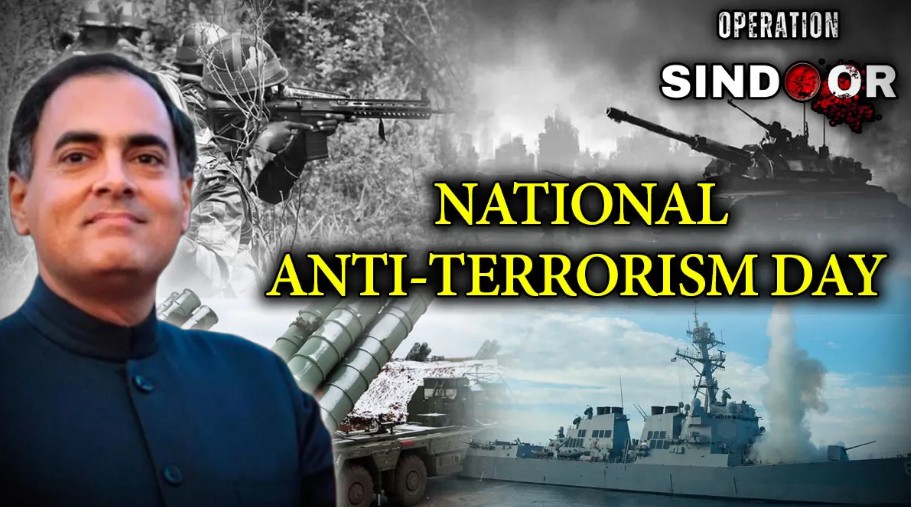
Every May 21st, India observes National Anti-Terrorism Day. This day honors sacrifices made in India’s fight against terror. This year, the day holds special significance due to recent events. The Pahalgam terror attack shocked the entire nation. Twenty-six innocent lives were lost in this brutal assault. The attack reminded everyone that terrorism remains a serious threat in our country. Soon after, India responded with Operation Sindoor. This military action showed India’s growing strength and resolve to fight terrorism effectively. National Anti-Terrorism Day 2025 is a moment to reflect deeply. It urges citizens to unite against violence and fear. How can India continue to protect its people? What lessons can we learn from recent events? This blog explores these questions and more.
The History and Significance of National Anti-Terrorism Day in India
National Anti-Terrorism Day is observed every year on May 21st to honor former Prime Minister, Rajiv Gandhi. He was assassinated by terrorists on this day in 1991, during an election campaign. The government declared this day as National Anti-Terrorism Day to remember his sacrifice and raise awareness about terrorism’s dangers. Since then, it has been a solemn reminder of terrorism’s devastating impact on individuals and society.
Over time, the day’s significance has grown beyond remembrance. It now promotes peace, social harmony, and vigilance against violence. Citizens are encouraged to reject hatred and uphold democratic values. Across India, pledge ceremonies, seminars, and awareness campaigns are organised. These activities strengthen the nation’s resolve to fight terrorism and foster unity.
The Spirit and Activities of National Anti-Terrorism Day
National Anti-Terrorism Day, observed in Rajiv Gandhi’s memory, emphasizes unity, peace, and vigilance. It fosters a collective mindset against terrorism and violence. The day highlights values of harmony, social cohesion, and the sacrifices made by victims of terrorism in India. It raises public awareness about terrorism’s impact and the need to protect the democratic rights of all Indian citizens.
On this day, government bodies, educational institutions, NGOs, and civil society organize events. These include pledge ceremonies, seminars, debates, and awareness campaigns. The activities reinforce India’s commitment to combat terrorism. The core message encourages rejecting violence and promoting social harmony. It calls for collective efforts to protect human lives with emphasis on national security.
The Pahalgam Terror Attack: A Stark Reminder of Terror’s Persistence
On April 22, 2025, terror struck the tourist town of Pahalgam. Militants shot dead 26 people, mostly from a particular community, in a blatant and gory manner. Most victims were tourists enjoying their vacation in the scenic Baisaran valley. The manner in which the attack was carried out created fear among the public. The attack was one of the deadliest in recent years. It shocked the nation and the world alike. The attack exposed critical vulnerabilities in civilian protection frameworks. It also revealed the evolving sophistication of terror methodologies. Consequently, the nation’s resolve to counter terrorism was profoundly reinforced.
The ramifications extended beyond immediate loss of life. Tourism and local economies suffered significant setbacks. Families and communities grappled with profound grief and trauma. The collective national mourning underscored societal solidarity and resilience. The incident underscored the indiscriminate nature of terrorism’s threat. It catalyzed comprehensive reviews and enhancements of security protocols. Public education campaigns intensified to bolster vigilance and preparedness. The Pahalgam attack remains a somber lesson in the ongoing war against terror.
Operation Sindoor: India’s Tactical Response and Strategic Message
On May 7th, 2025, India launched Operation Sindoor as a calibrated response. The operation targeted terrorist encampments linked to the Pahalgam atrocity. Precision airstrikes neutralized nine terror bases with surgical accuracy. Over one hundred militants were reportedly eliminated during the mission. The strikes were meticulously planned to minimize collateral damage. This operation showcased India’s advanced military capabilities and intelligence integration. It conveyed a resolute message of deterrence and national resolve. Defence Minister Rajnath Singh lauded it as a paradigm shift in counter-terrorism. Operation Sindoor exemplified the synergy of technology, strategy, and operational excellence.
The operation also demonstrated strategic restraint, avoiding broader escalation. India balanced assertive retaliation with diplomatic prudence. This measured approach garnered domestic and international commendation. The success bolstered morale within security forces and among the populace. Operation Sindoor is now studied as a benchmark for future engagements. It underscores the efficacy of swift, precise, and proportionate military responses. The mission reinforced India’s stature in the global counter-terrorism arena.
Terrorism Beyond Jammu & Kashmir: The Pan-India Challenge
Terrorism in India transcends regional confines, manifesting across diverse geographies. Maoist insurgencies disrupt stability in central and eastern India. Urban centers face threats from radicalized individuals and clandestine cells. The northeastern states contend with militant movements pursuing various agendas. National Anti-Terrorism Day serves as a reminder of terrorism’s multifaceted nature. Addressing these challenges necessitates a comprehensive, coordinated national strategy.
India’s security architecture has adapted to these complex threats. Enhanced intelligence sharing fosters timely threat identification and mitigation. Technological advancements augment surveillance and reconnaissance capabilities. Community policing initiatives build trust and facilitate grassroots intelligence. Public awareness campaigns educate citizens on recognizing radicalization signs. Youth engagement programs aim to preempt recruitment into extremist factions. Socio-economic development efforts address underlying grievances fueling insurgencies. This holistic approach fortifies India’s internal security fabric.
India’s Internal Security Strategy: Strengthening the War on Terror
India’s counter-terrorism paradigm has matured, emphasizing intelligence-led, rapid-response operations. Cutting-edge technologies, including drones and artificial intelligence, enhance situational awareness. Security personnel undergo rigorous training to confront evolving threats effectively. Inter-agency coordination between central and state entities has markedly improved. Border security protocols have been fortified with advanced detection systems. Public participation through vigilance and awareness campaigns remains pivotal. The government also prioritizes comprehensive support for terrorism victims and their families.
International collaboration constitutes a vital pillar of India’s strategy. Partnerships facilitate intelligence exchange and disrupt terror financing networks. Diplomatic efforts amplify pressure on entities harboring extremist groups. This multilayered approach integrates military, social, and diplomatic instruments. It reflects a nuanced understanding of terrorism’s complex dimensions. India’s strategy aspires to dismantle terror infrastructure while upholding democratic principles.
The Role of NGOs and Civil Society on National Anti-Terrorism Day
Non-governmental organizations and civil society actors are indispensable in India’s anti-terrorism ecosystem. On National Anti-Terrorism Day, they orchestrate educational and peace-building initiatives. Programs emphasize non-violence, social harmony, and community resilience. Victim support services provide critical psychological and rehabilitative assistance. These entities foster dialogue and understanding across diverse societal segments.
Civil society bridges the gap between citizens and state apparatuses. It advocates for security policies that respect human rights and freedom. NGOs enhance public trust in counter-terrorism measures through transparency and accountability. As Dr. A.P.J. Abdul Kalam articulated, “Terrorism is the enemy of humanity; peace is our only weapon.” Their sustained engagement is vital to nurturing enduring peace. Civil society’s contributions complement governmental efforts seamlessly.
Major Terror Attacks in India Since 2000: A Snapshot
| Year | Location | Attack Details | Casualties | Perpetrators |
|---|---|---|---|---|
| 2005 | Delhi | Bombings killing 60+ | 60+ | Lashkar-e-Taiba |
| 2008 | Mumbai | Coordinated terror attacks | 166 | Lashkar-e-Taiba |
| 2016 | Uri | Army base attack | 19 | Jaish-e-Mohammed |
| 2019 | Pulwama | Suicide bombing on CRPF convoy | 40+ | Jaish-e-Mohammed |
| 2025 | Pahalgam | Tourist massacre | 26 | The Resistance Front (TRF) |
Practical Steps for a Holistic Anti-Terrorism Strategy
National Anti-Terrorism Day 2025 compels adoption of a comprehensive security framework. Intelligence agencies must enhance real-time data integration and predictive analytics. Border management requires modernization with AI-enabled surveillance and rapid deployment units. Community policing and youth engagement programs should be expanded nationwide. Education fostering tolerance and critical thinking is paramount. Diplomatic efforts must persist in isolating terror facilitators globally. Victim support mechanisms demand augmentation for effective rehabilitation. Investment in cyber-security and counter-drone technologies is imperative.
True security transcends mere absence of violence; it embodies justice and equity. India’s war on terror must be waged with unwavering commitment and societal cohesion. National Anti-Terrorism Day serves as a clarion call to all citizens. Collective vigilance and proactive engagement remain indispensable. Together, India can fortify its defenses and safeguard its democratic ethos. This National Anti-Terrorism Day, reaffirm your commitment to vigilance. Support initiatives promoting peace, unity, and resilience. Together, let’s forge a safer, stronger India.
#NationalAntiTerrorismDay, #AntiTerrorismDay2025, #IndiaAgainstTerror, #PahalgamAttack, #OperationSindoor

Successive governments are not so very enthusiastic about the martyrdom of a previous PM.
Of late there have been over confidence on the part of the ruling dispensation. Some time back Amit Shah was bragging about not having any terrorist activity in the country after NDA (BJP) came to power. But the fact is that there had been 3 attacks in the last 5 years.
There had been a lax in intelligence gathering and war preparedness given the fact that we have two enemy neighbours-China and Pakistan.
People of Pakistan are nice people per se. It is the wavering governments and military that are causing the head ache for us. It is the military who train and shelter the terrorists in their own barracks.
So, in my opinion our army should destroy the entire military and ammunitions along with the hidden terrorists. Let us spare the civilians.
Our military is capable of achieving that.
It will end the Kashmir problem one and for all.
There should be a strong political will. We need not worry about the international community. There has been ongoing war between Ukraine and Russia, between Palatine and Israel. What did the UNO achieve in stopping the war?
If the has to be WW III so be it.
All corrupt and self-serving humanity will be destroyed ant new evolution will start over again.
This world has outlived its utility.